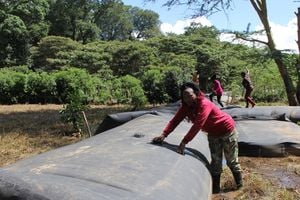Big Four Agenda is a welcome dose of realism from leaders

President Uhuru Kenyatta chairs a Parliamentary group meeting at State House, Nairobi, on December 13, 2017. PHOTO | FILE | PSCU
What you need to know:
- The government’s attempts at lessening the burden for the very poor and the multitude of jobless youths has not worked well.
- Our attempts to turn this country into a welfare State were doomed from the very start.
The government’s lofty ambition to create 1.4 million jobs through the revival of the manufacturing sector, home construction and revamping the health sector to offer millions of Kenyans universal healthcare is an idea which should have been floated and implemented decades ago.
Clearly, we got onto the wrong track when the previous governments decided to focus on giant infrastructure projects using borrowed money and paid little attention to the basics.
However, this is not to demean the goals set forth in the Vision 2030 development plan; they were sound but in many people’s minds, a little too ambitious, expensive and complicated.
The idea of transforming Kenya into an industrialising middle-income economy was noble and far-sighted, and we have the Standard Gauge Railway and an enviable road network all over the country to prove it, but as even the government itself is realising, you can’t govern well people who are both sickly and who have no idea what they will eat in the evening. A hungry people are easy prey to demagoguery.
REALISM
What we have here is a dose of realism. Apparently, we have come to realise that pure capitalism has never worked anywhere in the world for it leads to great inequality and sooner or later people become restive and even resort to violence.
The government’s attempts at lessening the burden for the very poor and the multitude of jobless youths has not worked well either mainly because the funds meant to cushion the disadvantaged were not used well or ended up in the pockets of a few. In short, our attempts to turn this country into a welfare State were doomed from the very start because we trusted the money to people whose venality knows no bounds.
In any case, at the moment, Kenya does not have the wherewithal to sustain many such programmes.
A resuscitation of the manufacturing sector may in the end prove to be more sustainable.
ESCAPE POVERTY
Some counties like Makueni have started dairy and fruit extraction plants and are not waiting for funds from the national government to roll out a universal health cover scheme. Should other counties follow suit, Kenya may eventually escape from debilitating poverty.
Certainly, there should be no reason why this country should be importing shoes, belts and other leather products from countries whose herds of animals are fewer than ours. There should be no reason why we sell our coffee in its semi-processed state only to import refined coffee from the same fellows who bought it from us. We have been too busy exporting our jobs and then crying foul.
****
When I was a youth, I attended two secondary schools where I learnt a great deal about relating with members of communities different from mine. I especially benefitted from association with chaps from different corners of the republic, including one bright chap from North Eastern known as Abdi.
HARMONY
I can’t remember there being any friction between us at Thika and Nyeri high schools, which have produced a sprinkling of senators, governors, academics, lawyers, pilots and a certified rogue or two. It was a good training ground for inter-communal harmony which today is in complete tatters.
Today we hate one another ferociously and are ruled by fear of one another. We are no longer a nation but a conglomeration of puny little nations with our own feudal lords who lead us from one unnecessary crisis to another. Today some of our elected governors have declared they don’t want “strangers” working alongside them or even breathing the same air as they do.
NEGATIVE ETHNICITY
Isn’t there a way in which our system can be reconfigured to allow the equivalent of advanced level education (Forms Five and Six) which used to mould students’ character as happened back in the 1960s and 1970s? Members of different communities would then, just before university, interact daily in a neutral learning environment devoid of negative ethnicity.
I know this is a vain plea, for our education system has undergone a complete metamorphosis, but something needs to be done. By the time our youths are joining university today, their thinking has become fossilised and they have already made up their minds that they could never trust their neighbours because they don’t speak the same vernacular language. A way should be found for them to start socialising early before their mindsets are cast in stone.





